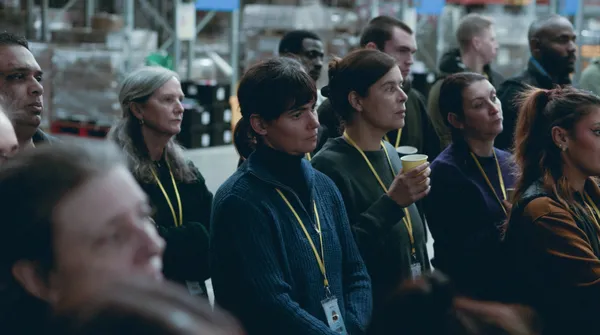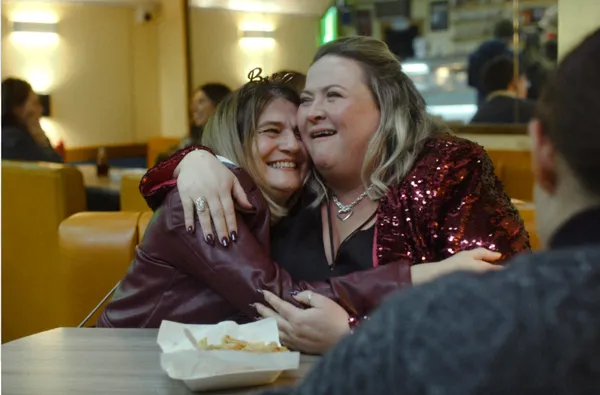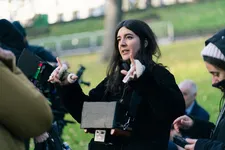 |
| On Falling director Laura Carreira: 'It was influenced by the idea of things being transitory. She is surrounded by people even though she’s lonely' Photo: Sixteen Films |
Laura Carreira's On Falling charts the loney life of a Portuguese warehouse picker (Joana Santos) in a Scottish fulfilment warehouse. The result is a thoughtful character study that highlights the pressures of the modern working environment, particularly for those in the gig economy. The film shared the Silver Shell for Best Director at San Sebastian (with Pedro Martín-Calero's The Wailing) and went on to win the Sutherland Award for best first film at London Film Festival. This week it had its Scottish premiere at Glasgow Film Festival and it will be on release across the UK from Friday, courtesy of Conic. In the first part of our interview, Carreira told us about her concerns that the gig economy is "consuming us". In the second part, we talk about how she worked with the cast and cinematographer to help highlight the film's themes.
Given the brief nature of some of the encounters Aurora has - such as late night with a hen party - can you tell me a bit about casting, because you’re relying on your cast to immediately generate that energy, which isn’t easy.
Laura Carreira: We saw some incredible Scottish actresses for all those parts in the hen party. We were all very aware that this moment is bittersweet because they're in no way. Harming Aurora but their presence is obviously bittersweet for her because this is, to a degree, something she'd like to take part in. It's almost funny the way they sit around her and she has to witness it.
Did you do a lot of rehearsal with your cast?
LC: We did. When I finished writing the script and we're going into production we did a breakdown and we realised we had to cast something like 55 speaking roles - and that was a big moment where I thought, “I’ve shot myself in the foot here”. It was influenced by the idea of things being transitory. She is surrounded by people even though she’s lonely. So It was important to have all these people around her but I realised that I’d bitten more than I could chew and it was going to be a challenge. Then we did a lot of casting. We found a lot of non-professional actors as well. Part of it was in the casting because we found a lot of people who were really talented and that was a big part of why it worked.
Then in the rehearsals it was very much just getting to know people because you know, on set we have such a short amount of time and to give them the freedom of like, “Okay, if I written a text and these words don't work for this person, feel very free to get hold of this and what would you say? Let's say that.” I think that just also makes the work so much more enjoyable and it was very freeing. It was a reminder that we can work collectively and I don't have to have the answers for everything. There was a lot of freedom and a lot of relief from that as well.
Physical connection is also very important in this film. There’s not so much of it but when it comes, you emphasise those moments with the camera.
LC: We called them the hyper-focusing moments. They were mainly, in the beginning, in relation to food because she doesn’t ask for help. So we were going to have to try to convey visually that she's struggling to eat because she doesn't ask anyone for help and she's, to a degree, trying to conceal it. So the camera is the only thing that reveals it and Karl Kürten, the DoP and myself developed this sort of strategy, where progressively the camera is going to start looking down at what she's eating and then the shot will become really close and longer.
 |
| On Falling director Laura Carreira on the scene shot on a hen night: 'We were all very aware that this moment is bittersweet' Photo: Sixteen Films |
So there's almost this expansion and we tried to almost be mathematical about it. So, how long have you been on the shot? Okay, next shot, we're gonna make it a little longer and then the same during the editing. At a point [we thought] for a character experiencing poverty, including scarcity of connection, maybe these moments should also reach touch. So that’s when it became important to expand these hyper-focusing moments of the camera to touch.
It must have been interesting for you to write this character who you, presumably, feel empathy for but at the same time you're putting her in difficult positions all the time.
LC: A big thing was that people weren't going to be mean to her. I wanted people to be at least a bit empathetic, that to me was important. She's a character who is almost experiencing performance anxiety. When she's given these moments of opportunity for a connection, she misjudges them slightly. I thought that was a really interesting part of the character because I think when someone is eager to connect it can actually make you worse at it.
I think we can feel compassion for that because sometimes when you're going through a moment in your life where you really think it is a really important moment it sort of immobilises you.
It’s interesting that you cast a Portuguese actress who was not living in Edinburgh. Was it always your plan that you wanted to bring somebody into that environment? To maybe help with the sense of alienation?
LC: I don't know if I thought of it that way. A big part was that Joana's English wasn't perfect and she kept bringing it up quite a lot, so I think it was a concern from her. She was like, “Laura, I sort of struggle with English” and I always thought, “That's a, that's why that's one of the reasons you're here”. I thought, relating to that performance anxiety, it's so beautiful to see someone really struggling to communicate. It’s a language that isn’t her own, so I felt it really connected her with the character and her fears.
Going to Portugal felt like a really important thing - to go and find the right actress for the role. Then, of course, Joana ended up connecting to the character even more because she was living in a similar way when she was living in Scotland. But I don’t know that I had that masterplan.
It’s interesting because other members of the cast have clearly lived in Scotland a long time, like the Spanish girl, with the Scots accent when she speaks English.
LC: It was part of showing that Scotland has that history - it’s very diverse. There's people who might have been there for 20 years. There's people who've just arrived. It's very mixed.
How long have you lived in Edinburgh?
LC: Twelve or 13 years now.
You’ve presumably drawn on your own experience of moving to Scotland
LC: In the first years I was mainly working with other economic migrants, and I remember being very like, “Where are all the Scots?” But it definitely influenced the film. I remember I worked in a cafe and I had a colleague who also talked about wanting a job to sit down and I always thought that was very funny. I’ve always felt very welcome in Scotland and with all the struggles I felt, I didn’t feel the struggles were imposed on me by the people I met.
It’s kind of obvious to say Scottish people are friendly, but they are - it was a very welcoming country to me. I have a great love and affection for this country that welcomed me. But obviously you also have the other side. I lived through Brexit, and that was odd.
In terms of her job, I noticed she kept getting orders for a lot of twine and rope, I wondered if that was deliberate on your part, to reflect darker thoughts.
LC: I guess a lot of the film is about her perspective and I think those would be the items that she would notice. It’s almost like a character who's, all of a sudden, seeing this darker side of the world. These are objects that, for example, came from interviewing pickers. A lot of them would say how surprised they were with the amount of sex toys and I thought, she’s going to pick that, because that seemed to be something they noticed. At the time when she’s picking ropes she’s noticing them and attributing a meaning to them and that’s more about the character’s perspective than necessarily everyone in the world is ordering rope or whatever.
This is your first feature but I'm assuming that you're already thinking about other things. Do you think you're going to continue with this sort of social realist Ken Loach/Dardennes vein?
LC: Yes, it comes naturally. The next one is set in an office, for example. That’s not a place that would necessarily be associated with social realism, so I’m quite curious to see how that works out. It's a different world but I think it's still very much about the same things. There will be some comedy in the next one, but probably a little bit like this one as well. I think it's more to do with the surreal ways in which we're living and that we're taking so much for granted. It's either a tragedy or it's a comedy and I'm thinking. It'll be somewhere in between.
- Read what Laura Carreira told us about our lives being defined by work

























